Results
-
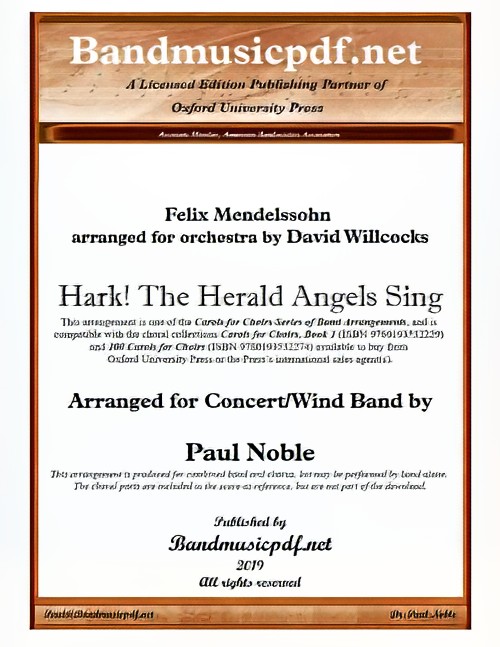 £75.00
£75.00Hark! The Herald Angels Sing (Concert Band with Optional Choir - Score and Parts) - Mendelssohn, Felix - Noble & Willcocks
Hark! The Herald Angels Sing is a Christmas carol that first appeared in 1739 in the collection Hymns and Sacred Poems. Its lyrics had been written by Charles Wesley. Inspired by the sounds of London church bells while walking to church on Christmas Day, he wrote the Hark poem about a year after his conversion to be read on Christmas Day. The popular version is the result of alterations by various hands, notably by Wesley's co-worker George Whitefield who changed the opening couplet to the familiar one, and by Felix Mendelssohn, whose melody was used for the lyrics. In 1840, a hundred years after the publication of Hymns and Sacred Poems, Mendelssohn composed a cantata to commemorate Johann Gutenberg's invention of movable type printing, and it is music from this cantata, adapted by the English musician William H. Cummings to fit the lyrics of Hark! The Herald Angels Sing, that propels the carol known today. This arrangement represents one in the Series of Band Arrangements compatible with David Willcocks' Carols for Choirs.
Estimated dispatch 7-14 working days
-
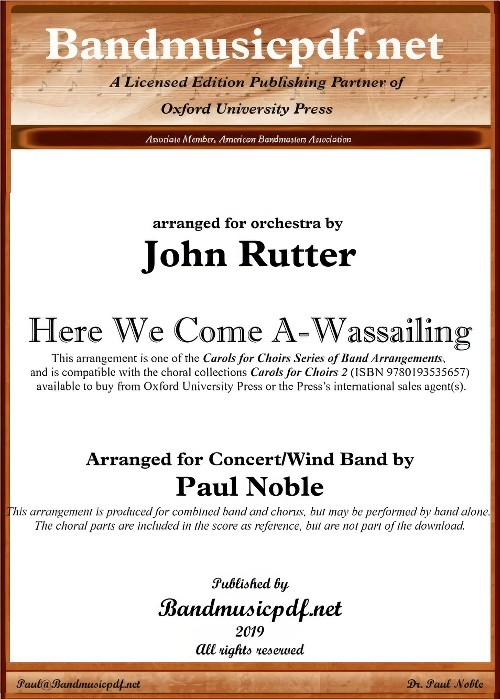 £75.00
£75.00Here We Come A-Wassailing (Concert Band with Optional Choir - Score and Parts) - Noble & Rutter
Here We Come A-wassailing (or Here We Come A-caroling) is an English traditional Christmas carol and New Year song, apparently composed c. 1850. The old English wassail song refers to 'wassailing', or singing carols door to door wishing good health, while the a- is an archaic intensifying prefix; compare A-Hunting We Will Go and lyrics to The Twelve Days of Christmas (e.g., Six geese a-laying). According to Readers Digest; the Christmas spirit often made the rich a little more generous than usual, and bands of beggars and orphans used to dance their way through the snowy streets of England, offering to sing good cheer and to tell good fortune if the householder would give them a drink from his wassail bowl or a penny or a pork pie or, let them stand for a few minutes beside the warmth of his hearth. This arrangement represents one in the Series of Band Arrangements compatible with David Willcocks' Carols for Choirs.
Estimated dispatch 7-14 working days
-
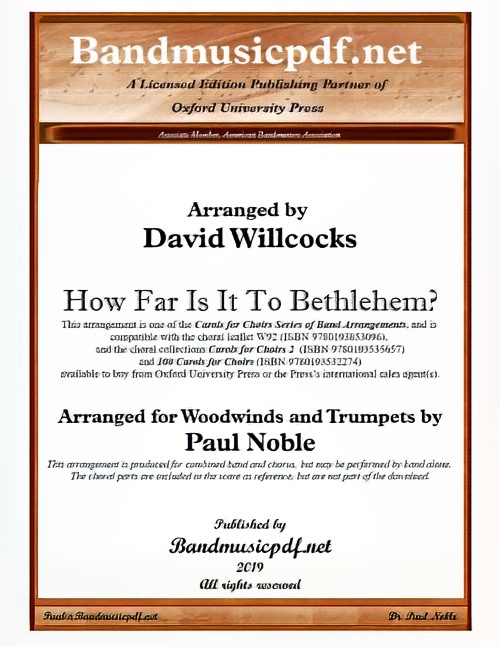 £75.00
£75.00How Far is it to Bethlehem? (Concert Band with Optional Choir - Score and Parts) - Noble & Willcocks
Written by Frances Alice Chesterton, wife of G. K. Chesterton, How far is it to Bethlehem? this carol expresses the profound longing we feel to experience firsthand the miracle of the Christmas story, not just as thinking adults, but with the wonder of children. The childlike question How far is it to Bethlehem? and the simple response Not very far begin this gentle carol. The lyrics go on to reveal the little smiles and tears that children bring as their gifts, as well as their inherent trust, as they fall asleep. This arrangement by David Willcocks is for SSA, and the instrumental accompaniment is the same voicing in groups of woodwinds and trumpets. This arrangement represents one in the Series of Band Arrangements compatible with David Willcocks' Carols for Choirs.
Estimated dispatch 7-14 working days
-
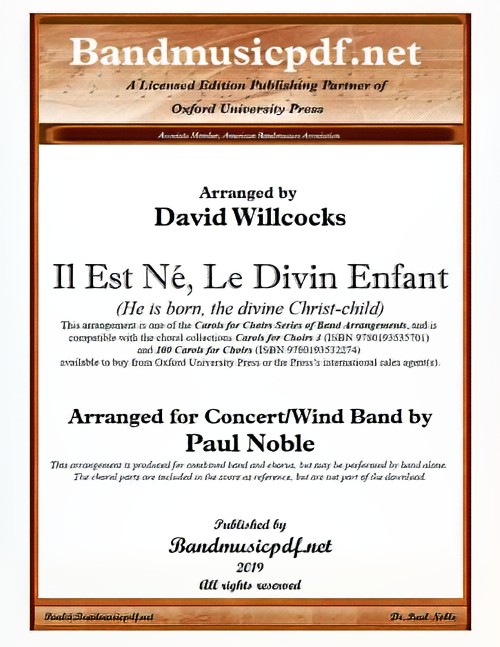 £75.00
£75.00Il Est Ne, le Divin Enfant (Concert Band with Optional Choir - Score and Parts) - Noble & Willcocks
Il est n, le divin Enfant (English: He is born, the divine Child) is a traditional French Christmas carol, which was published for the first time in 1862. The text of the carol, which is written in four stanzas, details the birth of Jesus and the wait of 4000 years for the event, as told by the prophets. It both observes the humility of God's birth in a stable and calls on the Kings of the Orient to attend the child. This arrangement represents one in the Series of Band Arrangements compatible with David Willcocks' Carols for Choirs.
Estimated dispatch 7-14 working days
-
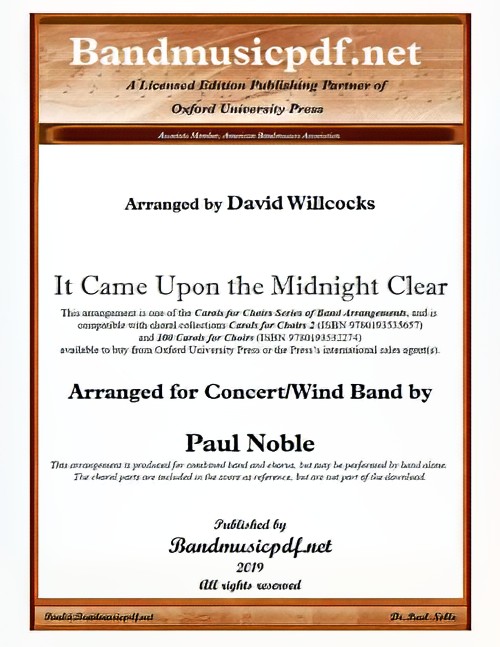 £75.00
£75.00It Came Upon the Midnight Clear (Concert Band with Optional Choir - Score and Parts) - Noble & Willcocks
It Came Upon the Midnight Clear (1849), sometimes rendered as It Came Upon a Midnight Clear, is a poem and Christmas carol written by Edmund Sears, pastor of the Unitarian Church in Wayland, Massachusetts. Writing during a period of personal melancholy, and with news of revolution in Europe and the United States' war with Mexico fresh in his mind, Sears portrayed the world as dark, full of sin and strife, and not hearing the Christmas message. In Commonwealth countries, the tune called Noel, which was adapted from an English melody in 1874 by Arthur Sullivan, is the usual accompaniment. This tune also appears as an alternative in The Hymnal 1982, the hymnal of the United States Episcopal Church. This arrangement represents one in the Series of Band Arrangements compatible with David Willcocks' Carols for Choirs.
Estimated dispatch 7-14 working days
-
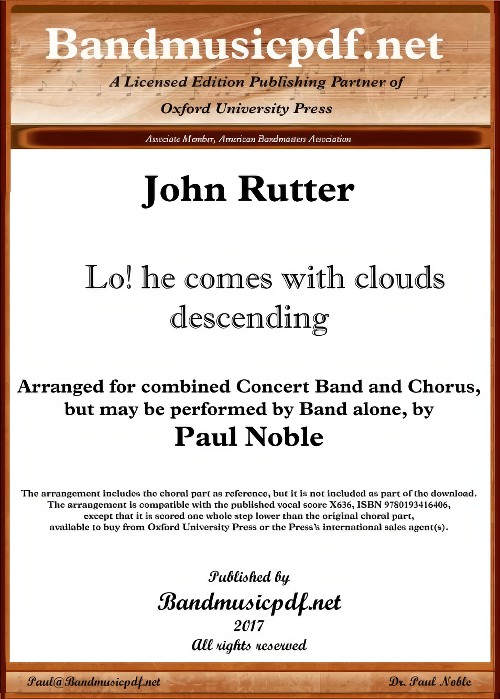 £75.00
£75.00Lo! He Comes with Clouds Descending (Concert Band with Optional Choir - Score and Parts) - Noble & Willcocks
Lo! He Comes with Clouds Descending is a hymn with a text by John Cennick (1718-1755) and Charles Wesley (1707-1788). Most commonly sung at Advent, the hymn derives its theological content from the Book of Revelation relating imagery of the Day of Judgment. Considered one of the Great Four Anglican Hymns in the 19th century, it is most commonly sung to the tune Helmsley, first published in 1763. This arrangement represents one in the Series of Band Arrangements compatible with David Willcocks' Carols for Choirs.
Estimated dispatch 7-14 working days
-
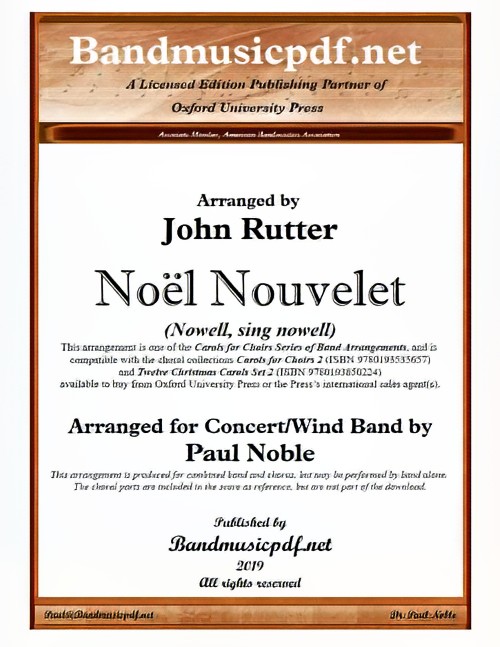 £75.00
£75.00Noel Nouvelet (Concert Band with Optional Choir - Score and Parts) - Noble & Rutter
Nol Nouvelet is a traditional French carol that dates from the late 15th century and the early 16th century. The song was long ago translated into English as Sing We Now of Christmas. The word nouvelet has the same root as Nol, both stemming from the word for news and newness. Nol Nouvelet literally means Christmas comes anew, Some sources say it was a New Year's song. But others point out that the lyrics all speak of the news of the birth of the Christ child in Bethlehem, the announcement by angels to the shepherds in the fields, looking forward to the visit of the Three Kings and the presentation of their gifts to the Holy Family. This arrangement represents one in the Series of Band Arrangements compatible with David Willcocks' Carols for Choirs.
Estimated dispatch 7-14 working days
-
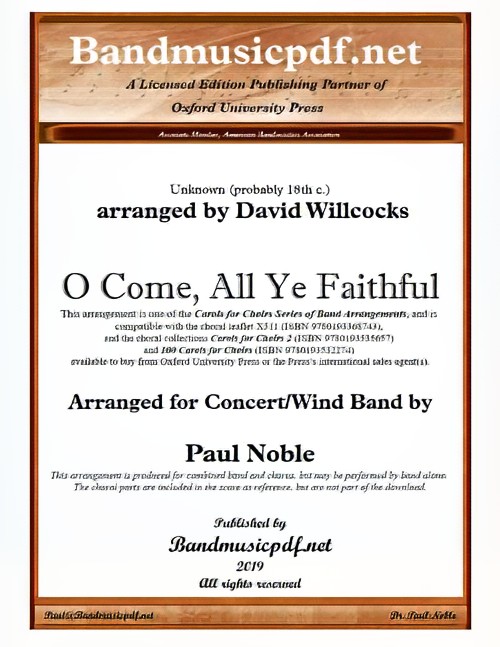 £75.00
£75.00O Come, All Ye Faithful (Concert Band with Optional Choir - Score and Parts) - Noble & Willcocks
O Come, All Ye Faithful (originally written in Latin as Adeste Fideles ) is a Christmas carol that has been attributed to various authors, including St. Bonaventure in the 13th century or King John IV of Portugal in the 17th, though it was more commonly believed that the text was written by Cistercian monks - the German, Portuguese or Spanish provinces of that order having at various times been credited. In modern English hymnals the text is usually credited to John Francis Wade, whose name appears on the earliest printed versions. A manuscript by Wade, dating to 1751, is held by Stonyhurst College in Lancashire. The version published by Wade consisted of four Latin verses. But later in the 18th century, the French Catholic priest Jean-Francois-tienne Borderies wrote an additional three verses in Latin; these are normally printed as the third to fifth of seven verses. O come, all ye faithful ranks as one of the most popular Christmas carols ever written, and the descant by David Willcocks has become famous the world over. This arrangement represents one in the Series of Band Arrangements compatible with David Willcocks' Carols for Choirs.
Estimated dispatch 7-14 working days
-
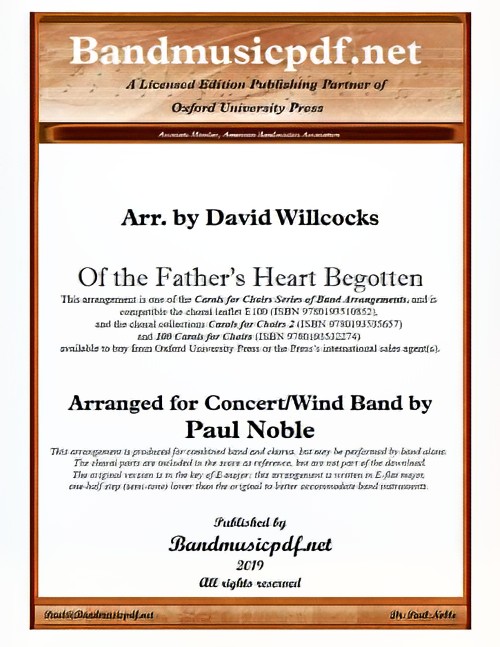 £75.00
£75.00Of the Father's Heart Begotten (Concert Band with Optional Choir - Score and Parts) - Noble & Willcocks
Of the Father's Heart Begotten alternatively known as Of the Father's Love Begotten is a doctrinal hymn based on the Latin poem 'Corde natus' by the Roman poet Aurelius Prudentius. The ancient poem was translated and paired with a medieval plainchant melody Divinum mysterium. Divinum mysterium was a Sanctus trope - an ancient plainchant melody which over the years had been musically embellished. An early version of this chant appears in manuscript form as early as the 10th century, although without the melodic additions, and trope versions with various melodic differences appear in Italian, German, Gallacian, Bohemian and Spanish manuscripts dating from the 13th to 16th centuries. Dissatisfied with an earlier translation, Roby Furley Davis (1866-1937), a scholar at St. John's College, Cambridge, wrote a new version for the English Hymnal of 1906. This version was also used in the popular Carols for Choirs series by David Willcocks. This arrangement represents one in the Series of Band Arrangements compatible with David Willcocks' Carols for Choirs.
Estimated dispatch 7-14 working days
-
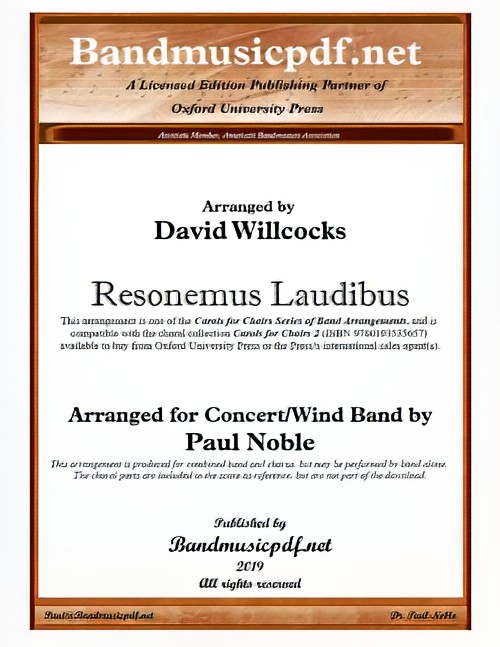 £75.00
£75.00Resonemus Laudibus (Concert Band with Optional Choir - Score and Parts) - Noble & Willcocks
Resonemus Laudibus is a 14th-century carol which was widely known in medieval Europe, and is still performed today. David Willcocks' arrangement brings a modern excitement to the piece, which would not have been out of place all those centuries ago. The Latin text is translated: 1. Resonemus laudibus cum jocunditatibus ecclesiam fidelibus. Let us make the church resound with the joyful praises of the faithful. Apparuit quem genuit Maria He whom Mary bore has appeared. 2. Deus fecit hominem ad suam imaginem et similitudinem. God made man in his own image and likeness. 3. Deus fecit omnia caelum, terram, maria cunctaque nascentia. God made all things, heaven, earth, the seas and all creation. 4. Ergo nostra concio in chordis et organo benedicat Domino. Therefore let our congregation praise God with strings and organ. 5. Et Deo qui venias donat et laetitias nos eidem gratias. And to God, who gives favours and happiness, we give thanks. This arrangement represents one in the Series of Band Arrangements compatible with David Willcocks' Carols for Choirs.
Estimated dispatch 7-14 working days
